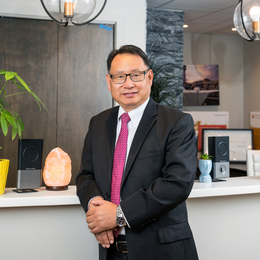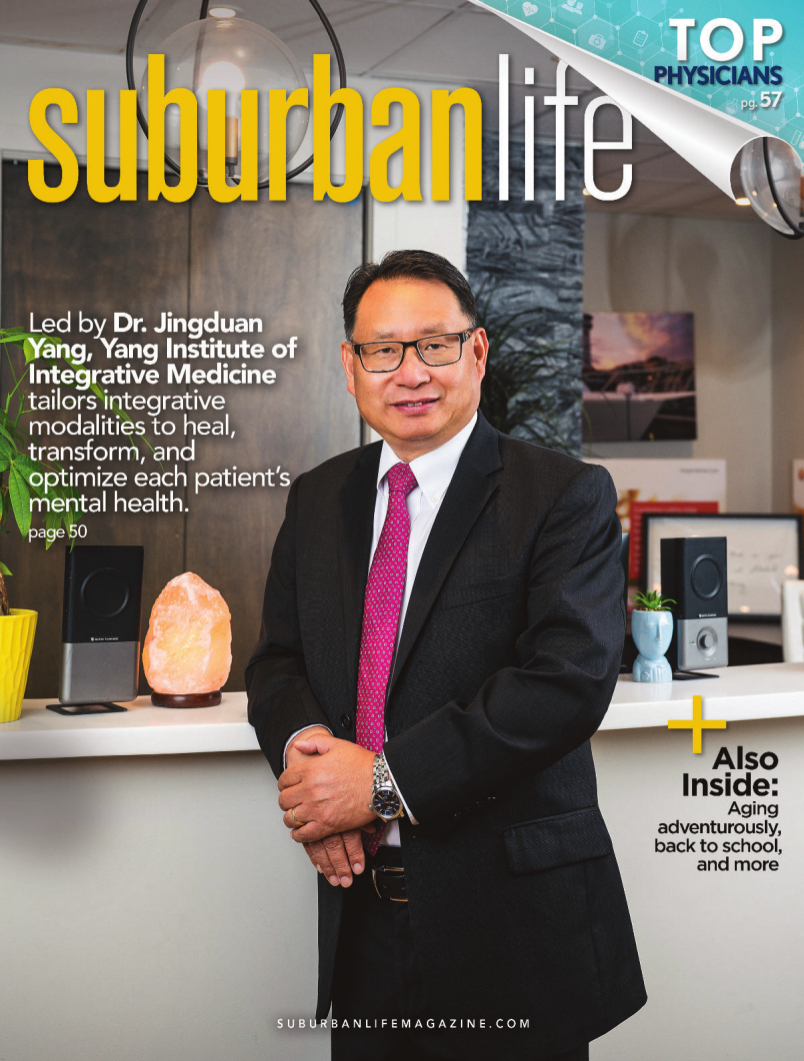
A Partner in Healing
Led by Dr. Jingduan Yang, Yang Institute of Integrative Medicine tailors integrative modalities to heal, transform, and optimize each patient’s mental health.
Jingduan Yang, M.D., traces his interest in medicine to his youth in China, where he watched his father provide acupuncture and herbal remedies to stimulate healing.
His childhood interest led him on a global search for knowledge and clinical experience, which ultimately blossomed into a well-established integrative medicine practice with three clinics in the Philadelphia area.
As founder and medical director of Yang Institute of Integrative Medicine, Dr. Yang strives to alleviate patients’ symptoms and address the root causes of mental and physical illnesses. He and his team of psychiatrists, practitioners of traditional Chinese medicine, and other care providers treat “the whole person” through noninvasive modalities designed to address a person’s biochemical imbalance—without medication, when possible. Their shared goal: to heal, transform, and optimize each patient’s mental health.
“A lot of the people who come here have suffered for a long time,” Dr. Yang says. “They have suppressed their problems to function and survive, but they get to the point where they can no longer do that. Our problems accumulate as we get older, and our resilience and endurance diminish. People experience all kinds of problems throughout life, and they come here for solutions.
“We believe a lot of the mental health problems we see are a combination of brain dysfunction and chemical imbalance, plus individuals’ learned responses and reactions to behaviors,” he continues. “Without addressing the biochemical imbalance and energetic /physiological problems, it’s almost impossible to understand how to help patients change their behaviors and emotional reactions to the things that trouble them.”
Dr. Yang’s approach differs from traditional means of helping patients address mental health disorders. Conventional psychotherapy may help patients correct cognitive distortion, express their feelings, and learn effective coping mechanisms, but Dr. Yang believes the conventional approach “does very little to touch the heart.”
“A lot of people who suffer from chronic mental health issues have some kind of posttraumatic stress disorder, caused by growing up with stressful situations,” he says. “Although we can address their cognitive memories through psychotherapy, we do not access the emotional/physiological memories that have never left us. A smell, a situation, a person, anything that reminds them of their past traumas—the body will have an automatic response that can be as traumatic as a panic attack. We need to address the root so they can move forward.”
Likewise, Dr. Yang cites issues pertaining to the use of medication to address mental health conditions such as depression and anxiety, among others. He suggests the human body learns to resist medication over time, thereby blunting its long-term effectiveness, while also risking unwanted side effects. While he believes medication does have merit, he also says it should be used as a supplement, not as a solution.
“Our research has led us to think that medication as a treatment for mental illness only makes people feel different; it does not actually make them different,” he adds. “It doesn’t address the underlying cause of the chemical imbalance or energetic/physiological issues.”
At Yang Institute for Integrative Medicine, the path to better mental health begins with a panel of bloodwork and a urine and stool analysis. Follow-up discovery may come through in-depth discussions and a quantitative electroencephalogram (EEG) to provide a detailed analysis of the brain’s activities and performance. From there, Dr. Yang and his team will develop a customized treatment plan designed to normalize any abnormalities.
Tailored treatments may include acupuncture and herbal remedies, advanced nutrient therapy, functional medicine, psychotherapy, medication management, transcranial magnetic stimulation (TMS), neurofeedback, and neuromodulation. The institute offers programs curated specifically for younger patients, treating conditions as mercurial as autistic spectrum disorder and attention deficit and hyperactivity disorder (ADHD). He finds this aspect of the work “very rewarding and important.”
“The young brain is in the process of development,” he says. “If we help them now, the long-term outcome is much better.”
Young professionals, ages 25 to 55, make up another large segment of the practice’s patient population. People in this age bracket often contend with an abundance of stressors associated with family, career, and finances. The conglomeration of so many stressors, combined with any unresolved issues, can lead to substantial mental, emotional, and physiological burdens.
“We’re not just helping people get out of crisis and putting an end to their suffering,” Dr. Yang says. “We want to optimize their function. We see a lot of people who, on the surface, are very successful, but inside they suffer from depression, anxiety, and tension. Our goal is to help them be able to enjoy life the way they should.”
Dr. Yang has either studied alongside or collaborated with some of the biggest names in his field, including Daniel Amen, M.D., William J. Walsh, Ph.D., and Andrew Weil, M.D., the third considered one of integrative medicine’s true pioneers. Dr. Yang’s published works include 2016’s Facing East: Ancient Health and Beauty Secrets for the Modern Age, co-authored by fashion icon Norma Kamali, and 2017’s Clinical Acupuncture and Ancient Chinese Medicine, an Oxford University Press publication co-authored by integrative medicine expert Daniel A. Monti, M.D.
Apart from Yang Institute for Integrative Medicine, Dr. Yang has been involved in several groundbreaking developments: the creation of a new medical school and an integrative surgical center in Middletown, New York, as well as the founding of an international conference devoted to the propagation of integrative medicine.
On a Path to Positive Change
Dr. Yang was 13 years old when he became enamored with his father’s approach to medicine, which, in turn, compelled him to pursue a career in modern medicine. In medical school, he became interested in neuroscience and psychology, as well as philosophy. His journey took him far from home—Australia and England, then back to China, and, finally, to the United States.
Dr. Yang was 13 years old when he became enamored with his father’s approach to medicine, which, in turn, compelled him to pursue a career in modern medicine. In medical school, he became interested in neuroscience and psychology, as well as philosophy. His journey took him far from home—Australia and England, then back to China, and, finally, to the United States.
“I came here to be a psychiatrist,” he says.
In 1999, he became a psychiatric resident at Thomas Jefferson University in Philadelphia, where he first crossed paths with Dr. Monti. After the residency ended, Dr. Yang joined Dr. Monti in practicing psychiatry and acupuncture in the integrative medicine center at Jefferson. Dr. Yang later went to the University of Arizona for an integrative medicine fellowship, where he studied under the esteemed Dr. Weil.
After several years of honing his skills in integrative medicine, Dr. Yang branched out on his own by opening his first clinic in South Jersey. Yang Institute of Integrative Medicine has since evolved and expanded to locations in Philadelphia, Bryn Mawr, and across the river in Marlton.
“We are here to be your partner,” Dr. Yang says. “We are here to support what patients want to accomplish and facilitate the healing process. The patient has to understand that it’s a lifelong process, a constant battle between two forces. We are part of the force that is trying to fight the one that wants to bring them down.
“With a broken mind or a broken brain, nobody can see it or know it, and people think you choose the way that you are,” he continues. “There is something to be done. We want people to be able to control their life by addressing the root cause of what’s troubling them, and put them on a path so they can change for the better.”
Yang Institute of Integrative Medicine
yanginstitute.com
yanginstitute.com
999 Route 73 North, Suite 200
Marlton, NJ 08053
(856) 802-6888
Marlton, NJ 08053
(856) 802-6888
940 E. Haverford Road, Suite 201
Bryn Mawr, PA 19010
(610) 520-1128
Bryn Mawr, PA 19010
(610) 520-1128
1608 Walnut Street, Suite 1700
Philadelphia, PA 19103
(215) 600-0062
Philadelphia, PA 19103
(215) 600-0062
Photo by Jeff Anderson
Published (and copyrighted) in Suburban Life, August 2023.



